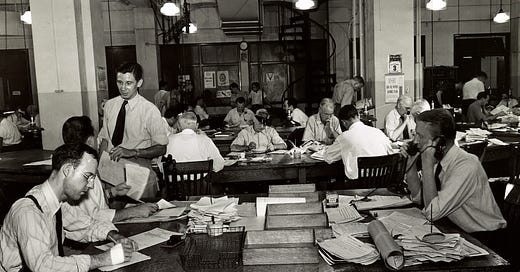The Fourth Estate is crumbling
The freedom of the press is being eroded; and not just in Donald Trump's White House.
When the Associated Press was banned from US presidential events for news agencies over its refusal to call the Gulf of Mexico the Gulf of America, a gasp echoed through the journalistic world. If a failure to acquiesce to the petty request of an orange-coloured tyrant could get you banned, what would happen if journalists did their job and were - oh, I don’t know - critical of Trump and his acolytes?
Well, welcome to my world. Or, rather, welcome to the world of the business-to business journalist; a place where you can find yourself blacklisted over something you said, something you didn’t say; or something you said which was right but didn’t sit well with certain people.
At the time of writing this, I am on a growing handful of blacklists; I am also the victim of several shadow bans. I am excommunicado; a pariah. My crime? In many instances, I refused to tow the party line. In others, I merely held up a mirror upon the field in which I work and the industry didn’t like what they saw in their reflection. In one specific instance, I was banished to the naughty step for - get this - calling out the demolition and construction industry for its lamentable site fatality track record. As a result of my heresy, I have been banished by one of the largest construction equipment manufacturers in the world because, as they put it, “my values did not align with theirs”. If their values mean turning a blind eye to people dying on demolition and construction sites then, frankly, I have no desire for mine to align.
This was ever the case. In international, national, local and business-to-business journalism, there have always been those that were a bit too straight-talking; a bit too “warts and all” in their reporting. These individuals often found themselves sidelined lest they cause offence to a notable industry figure or - worse - an advertiser.
But the situation has been exacerbated by the dawning of the “influencer age” and by the apparent inability of some to distinguish between someone who earns their keep dancing on TikTok, and those of us that studied journalism.
There are many differences, of course. And key among them is that, if you pay the average influencer enough, if you ply them with gifts, and take them to nice places, they will say nice things about you. Hell, they even have contracts that agree the positivity of their “coverage” in advance.
Journalists - the real ones - don’t do this. The freedom of the press - to an ever-decreasing degree - means they can report whatever the Hell they wish. They’re not concerned with positive and negative; good or bad; upbeat or downbeat. They want to report the facts. They are answerable not to a brand or an organisation; only to their readers.
Unfortunately, this era has also heralded the arrival of publications (I can’t call them magazines because they are something else; something “other”) that have deliberately positioned themselves between journalist and influencer, even though they themselves are neither.
There are two such publications in the market sector where I operate. One of them actually claims in its mission statement that it only publishes positive news. So accidents and fatalities, company collapses and corruption never find their way onto their pages, thereby doing a massive disservice to its admittedly tiny readership for whom this real news is a key talking point.
The other magazine, while relatively new, has already set its stall out. There’s a very upbeat article about a company that flows across three or four pages. Two or three pages later, there’s an advertisement from the same company. This is repeated throughout. The message is simple. Cross our palms with silver and we promise to say nothing but nice things about you, your product, or your service.
Who does that serve? I am sure it gives the marketing department of the company a nice warm and fuzzy feeling; it might lead the MD to believe his advertising money has been well spent. But what of the readers? Do they not demand and deserve just a soupçon of truth and reality?
Imagine how dull and uninteresting the old Top Gear show would have been if, each week, Messrs Clarkson, Hammond and May told you that each and every new car was the greatest vehicle ever invented. Surely, at some point, even the most gullible viewer would have smelled a rat?
In the grand scheme of things, being ostracised by the maker of some diggers is hardly earth-shattering. It is certainly not on the scale of the Associated Press ban. And besides, while I have been on the naughty step of one or the biggest equipment makers for about six years now, the other nine biggest brands in the world are still willing to tolerate my presence.
But this is an issue that is not going to get better any time soon. As we have seen with Jeff Bezos’ muzzling of his Washington Post title (presumably so he gets to hang out with the big orange guy), there is a significant move to, if not silence the press, at least make it do as it is told.
As a living, breathing journalist (as opposed to a peddler of positive news), it pains me to fall back upon cliches. But, in this instance, it seems apt. Mahatma Gandhi once said: “The press is called the Fourth Estate. It is definitely a power, but to misuse that power is criminal”.
My fear now is that the Fourth Estate is crumbling.




